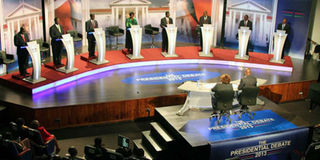Impact of presidential debate on voters in August 8 election

Candidates participate in the 2013 presidential debate at BrookHouse School in Nairobi on February 28, 2013. Presidential debates can provide some substantive discussion. PHOTO | JOAN PERERUAN | NATION MEDIA GROUP
What you need to know:
- They can provide voters with new information about the candidates.
- In the televised debates we are likely to get more factual information.
The discourse on the presidential debate has raised questions on its organisation, format and value.
Some of the questions have arisen because we have not quite internalised or localised this media import from older democracies where the holding of presidential debates is the norm.
Our first presidential debate was in 2013, and it was based on the American format.
Despite this problem of glocalisation — taking into account local culture and global practices — debates can help to enhance our democracy.
INFORMED DECISIONS
At the very least, they can provide voters with new information about the candidates.
There could be other benefits despite the problems being experienced in organising the debate.
It’s no secret — despite Jubilee Secretary-General Raphael Tuju saying the “whole thing smells of conmanship” — that Debates Media Limited that is organising it belongs to the media houses.
The company may have problems organising the presidential debate but “conmanship” is not one of them. at BrookHouse School Nairobi
CHALLENGES
It’s no secret either that organising a debate that makes every presidential candidate happy is a daunting task.
This is so, especially with eight presidential candidates, including six who are generally considered as small-time and two dominant ones — the sitting president and the opposition leader.
There are many political and organisational hurdles and sensitivities to be overcome.
With the presidential race as close as it is between Uhuru Kenyatta and Raila Odinga, we should expect heightened sensitivities and endless speculation about the purpose of the debate and whether or not it would serve any useful purpose.
DEBATE FORMAT
The format of the debate is equally daunting.
It includes agreement on the rules on how the debate is to be arranged — placement of candidates, topics to be discussed, questions to be answered, order of speaking, time allocation, time segments, a selection of a moderator and his or her role, and whether or not the public will be allowed to ask questions.
It’s not easy and it’s no wonder that it’s precisely on agreeing on the format that the debate seems to have been bogged down.
Besides the potential of providing voters with new information about candidates, presidential debates can have other benefits although research in the older democracies shows that they have limited or no effect on voting patterns.
POLITICAL AWARENESS
Indeed, American political scientists who have examined masses of data since 1960 when televised presidential debates became the norm in the US have found that when it comes to winning enough votes to decide the outcome of an election, presidential debates do not count for much.
One of the benefits is agenda setting. Viewers hold post-debate discussions on the topics and sound bites.
This deepens the political discourse. Another benefit is that debates attract huge television audiences and create greater political awareness.
INTERACTION
Small-time candidates can get exposure they could only have dreamt of.
Still another benefit is the interactive nature of the debates.
Unlike rallies in which candidates make statements without being questioned or challenged, in the debates they can be questioned or challenged.
Debates are a welcome relief from the one-sided diatribes and tongue-lashing the public is constantly inundated with in the rallies by the candidates, their surrogates and proxies.
ISSUES
In the televised debates we are likely to get more factual information.
Unlike public rallies, presidential debates can provide some substantive discussion.
Debates are likely to force candidates to focus on issues rather than personalities or propaganda, making them more accountable.
This, at least in theory, can help voters to make better-informed choices.
The debates also have great news value.
The candidates also entertain us with what they say and how they say it.
So, despite the teething problems of glocalising presidential debates, they are worth it and are likely to stay.
Send your complaints to [email protected]. Text





